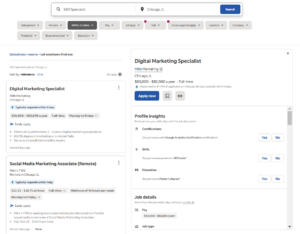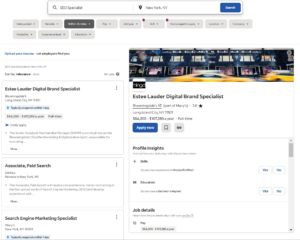Let’s say you’re an SEO professional looking for a job on Indeed.com.
I want to show you something weird.
Open your browser, go incognito, and type “SEO Specialist” in Chicago or in New York. What you’d expect are job listings relevant to your expertise. Instead, you get results that are completely off the mark.
For example, in New York, you’ll see jobs SEM (Search Engine Marketing) specialists — a totally different field. This is like a Dentist searching for work and seeing listings for Dental Equipment Repair Technicians. Same general area, but not the same thing at all.
What Happened to Indeed?
It’s not always been this bad. A few months ago, I hired two excellent SEO specialists through Indeed. Back then, the platform worked as expected — it matched job seekers with the right roles. But now? It feels broken.
Recently, I’ve noticed a flood of irrelevant applicants — Graphic Designers, IT Support Staff, even Software Technicians — none of whom have any SEO experience. I’m not talking about the occasional mismatch everybody is experiencing when going through job applications. We all now that this happens a lot. I’m talking about a near-total shift in the type of candidates showing up.
Curious, I decided to investigate.
I searched for SEO jobs on Indeed myself, and it quickly became clear what’s going on: the Indeed algorithm doesn’t seem to know what an SEO specialist is anymore. Instead, it pulls in any job where the keywords “SEO” are mentioned, even if the role has nothing to do with it.
Why Is This Happening?
According to Indeed, their search algorithm now tries to “understand user intent,” much like Google’s search engine.
This is what Indeed writes and what they call a “Targeted Approach”:
“[…] our job search system is designed to prioritize relevance for job seekers by considering their profiles and search behavior. This means that while your postings might not always appear prominently when viewed from your perspective as an employer, they are being displayed to job seekers whose profiles match the job’s criteria.”
The problem?
Indeed isn’t Google.
Their attempt to guess what job seekers and employers mean has led to a mess of irrelevant results.
For example, if someone searches for “SEO,” Indeed might throw in anything remotely related to marketing, IT, or even general digital skills. The result is frustration on all sides — qualified SEOs can’t find jobs, and agencies like mine waste money on ads that attract the wrong applicants from what I can tell.
What This Means for SEO Agencies
If you’re running job ads on Indeed, you might want to hit pause. When I reached out to their support team, all I got were in my opinion generic, canned responses that didn’t even acknowledge the real issue. Meanwhile, I was spending money and getting nothing but junk applications.
After switching to LinkedIn Jobs, things improved almost immediately. I started getting relevant candidates again — actual SEO professionals who know their stuff. That said, LinkedIn doesn’t quite match the scale Indeed used to offer. But right now, that’s your only alternative.
Are SEOs Still Looking for Jobs?
Some people might think the lack of results means SEOs just aren’t looking for work anymore. That’s completely wrong. If anything, there are more SEOs out there job hunting than ever before. The problem isn’t with the talent pool — it’s with Indeed we’re using to connect.
Indeed’s current system is making it harder, not easier, for agencies and job seekers to find each other.
What Can You Do?
If you’re an SEO job seeker:
- Don’t rely solely on Indeed. Check out other platforms like LinkedIn or industry-specific job boards.
If you’re an SEO agency:
- Stop throwing money at Indeed until they fix this mess. Test other platforms and diversify your hiring efforts.

 by
by 



